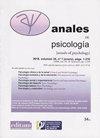Interpersonal forgiveness: validation of the Enright Forgiveness Inventory (EFI-30) in the Spanish sample
IF 1.3
4区 心理学
Q3 PSYCHOLOGY
引用次数: 0
Abstract
Background: Numerous studies have demonstrated the importance of interpersonal forgiveness after a specific offense for improving the health and well-being of individuals. Despite its importance, there is an evident lack of forgiveness evaluation instruments adapted to the Spanish context. The Enright Forgiveness Inventory (EFI-30) is the questionnaire that implements one of the most established and recognized theoretical models in the area of forgiveness. The aim of the present study is to adapt the EFI-30 for the Spanish population and evaluate its psychometric properties. Method: A sample of 426 undergraduate and graduate students (98 men, 328 women) aged from 18 to 30 years (M = 21.24; SD = 2.91), completed the EFI-30 after its adaptation to the Spanish context, as well as the Transgression Related Interpersonal Motivations Inventory (TRIM-18), the Remedial Strategies Scale (RSS) and the Depression Anxiety and Stress Scale (DASS-21). Results: The Confirmatory Factor Analysis showed a good fit to the original six-factor structure (CFI = .91, TLI = .90, IFI = .91, RMSEA = .067). The reliability of these subscales and the instrument was similar to the original version. The results showed adequate criteria and convergent validity. Conclusions: The EFI-30 shows adequate psychometric properties within the Spanish context and is an appropriate instrument for evaluating interpersonal forgiveness of a specific offense in research and clinical intervention. Antecedentes: Diversos estudios demuestran la relevancia del perdón interpersonal tras una ofensa para mejorar la salud y el bienestar. A pesar de su importancia, es evidente la falta de instrumentos de evaluación del perdón adaptados al contexto español. El Enright Forgiveness Inventory (EFI-30) es el instrumento que operacionaliza uno de los modelos teóricos más asentados y reconocidos en el área del perdón a nivel mundial. El objetivo del presente estudio es adaptar el EFI-30 a la población española y revisar suspropiedades psicométricas. Método: 426 estudiantes de grado y máster (98 hombres y 328 mujeres) con edades entre 18 y 30 años (M = 21.24; DE = 2.91), completaron el EFI-30 tras su adaptación, así como Transgression Related Interpersonal Motivations Inventory (TRIM-18), Remedial Strategies Scale (RSS) y Depression Anxiety and Stress Scale (DASS-21). Resultados: El Análisis Factorial Confirmatorio indicó buen ajuste a la estructura original de seis factores (CFI = .91, TLI = .90, IFI = .91, RMSEA = .067). La fiabilidad de las subescalas y del instrumento general fue buena, similar a la versión original. Los resultados mostraron adecuada validez convergente y de criterio. Conclusiones: EFI-30 muestra adecuadas propiedades psicométricas en un contexto español, siendo una medida apropiada para evaluar el perdón interpersonal de una ofensa especifica en al ámbito de la investigación e intervención clínica.人际宽恕:Enright宽恕量表(EFI-30)在西班牙样本中的验证
背景:许多研究表明,在特定的冒犯之后,人与人之间的宽恕对于改善个人的健康和幸福的重要性。尽管宽恕很重要,但显然缺乏适合西班牙情况的宽恕评价工具。Enright宽恕量表(EFI-30)是一份问卷,它实现了宽恕领域最成熟和公认的理论模型之一。本研究的目的是适应EFI-30西班牙人口和评估其心理测量特性。方法:选取18 ~ 30岁的本科生、研究生426人(男98人,女328人)为样本(M = 21.24;SD = 2.91),在适应西班牙语境后完成了ef -30,以及越轨相关人际动机量表(TRIM-18)、补救策略量表(RSS)和抑郁焦虑和压力量表(DASS-21)。结果:验证性因子分析与原六因子结构吻合良好(CFI = 0.91, TLI = 0.90, IFI = 0.91, RMSEA = 0.067)。这些量表和仪器的可靠性与原始版本相似。结果表明:标准完备,效度收敛。结论:EFI-30在西班牙语境中显示了足够的心理测量特性,是在研究和临床干预中评估特定犯罪的人际宽恕的适当工具。前言:Diversos工作室展示了人际交往的相关性(perdón),人际交往的相关性(para - mejorar - la - salud)。一项如此重要的研究表明,在evaluación和perdón的所有背景下,工具的变化是明显的español。El Enright宽恕清单(EFI-30)是一种可操作的工具,可用于收集数据模型(teóricos más)和数据模型(área del perdón)。本研究的目的是通过修订psicomacimtricas,提出一种适应EFI-30和población española的研究方法。M = 21.24; 426名学生de grado y máster(98名hombres y 328名mujeres) conedades entre 18 y 30 años (M = 21.24;DE = 2.91),完成EFI-30量表(adaptación, así), como越轨相关人际动机量表(TRIM-18),补救策略量表(RSS)和抑郁焦虑压力量表(DASS-21)。结果:El Análisis因子确证indicó在调整了原结构因子后(CFI = .91, TLI = .90, IFI = .91, RMSEA = .067)。La fiabilidad de las subescalas y del instrument general fufuena,类似于La versión original。所得结果证明了该方法的收敛性。结论:EFI-30在人际交往中对人际交往中特定行为的评价为ámbito de la investigación e intervención clínica,在人际交往中对特定行为的评价为español。
本文章由计算机程序翻译,如有差异,请以英文原文为准。
求助全文
约1分钟内获得全文
求助全文
来源期刊

Anales De Psicologia
医学-心理学
CiteScore
3.30
自引率
5.90%
发文量
57
审稿时长
4-8 weeks
期刊介绍:
Anales de Psicologia / Annals of Psychology is a multidisciplinary journal of the various thematic areas of scientific psychology. It publishes original research articles and theoretical review in any of its basic, applied and methodological areas included within psychology.
Publishing, financing, marketing and distribution corresponds Editum: Editions of the University of Murcia (Spain). The organizational guidelines and editorial policies come from the Editorial Team (elected for four years by the Areas and / or Departments of Psychology at the University of Murcia) and the Editorial Board, composed of scholars and experts from different universities and institutions national and international. It is published in print (ISSN: 0212-9728) since 1984 and in Internet publishing (web) (ISSN: 1695-2294) since 2000. Available online full text in pdf from the vol. 1 1984.
Anales de Psicologia / Annals of Psychology maintains a system of exchange with other journals and publications of psychology in the world. Through an free exchange agreement with their respective publishers or entities responsible for editing, these journals and publications are received at the University of Murcia (Biblioteca "Luis Vives", near the Faculty of Psychology) and in return, our journal is sent to libraries and educational and research institutions such centers responsible for editing.
 求助内容:
求助内容: 应助结果提醒方式:
应助结果提醒方式:


